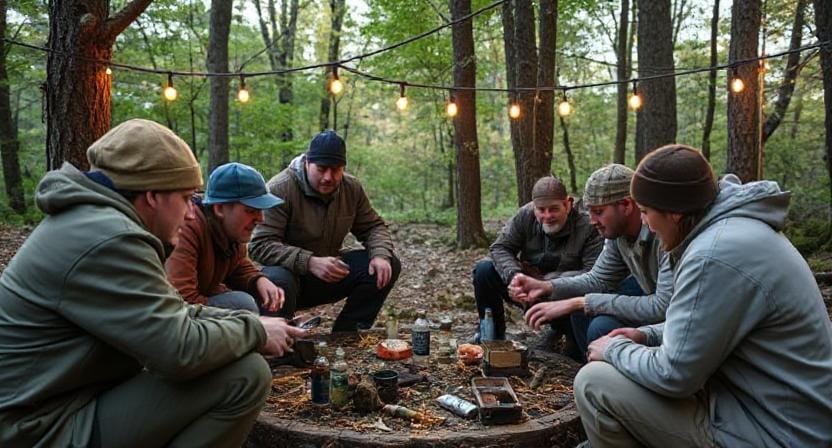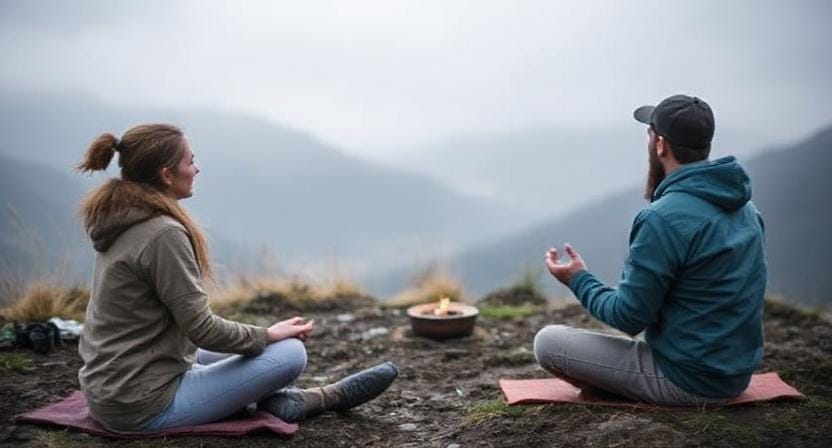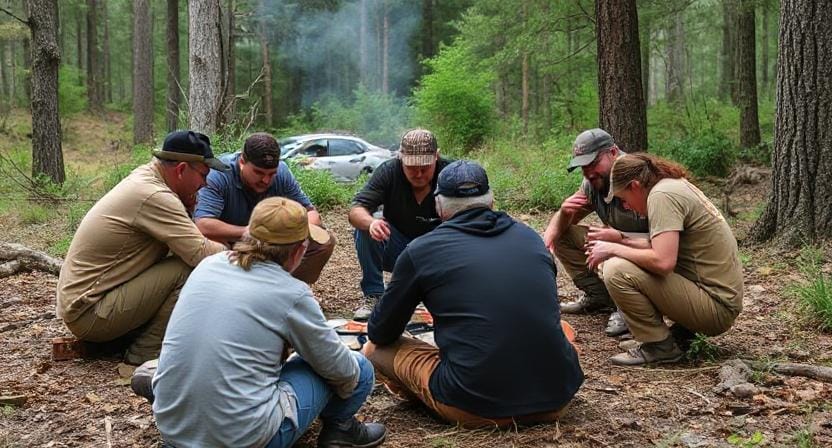Last Updated on November 1, 2025 by Kevin Collier

Top Takeaways and Key Concepts
- Recognize Survival Mode Signs: Identify fatigue, irritability, and difficulty focusing as early stress indicators.
- Implement the STOP Technique: Pause, observe, proceed mindfully to manage emotional responses.
- Establish a Routine: Maintain regular sleep, meals, and activities to provide structure.
- Engage in Grounding Exercises: Use sensory activities like the 5-4-3-2-1 method to stay present.
- Seek Social Support: Connect with trusted individuals to share experiences and reduce isolation.
Imagine that you are in the middle of nowhere, with huge trees and pure air all around you. It feels great, doesn't it? Your gear is ready, and a nice bonfire is crackling. But hold on. You have the berries you found. They appear a little strange. Are they okay?
You suddenly have the idea. You can't watch cat videos, text your friends, or use the internet. Oh no! Panic can come on faster than a raccoon stealing food.
Please Note: This post may contain affiliate links. If you click one of them, we may receive a commission at no extra cost to you. As an Amazon Associate, I earn from qualifying purchases.
It's just as crucial to have food and drink as it is to keep your mind healthy. It's normal to be worried. A lot of people do it. Let's talk about some techniques to be calm and focused.
Take a big breath first. Take a deep breath and hold it for a few seconds, then let it out slowly. I promise it helps. Don't forget that nature is all around you. Hear the birds and feel the wind. It can be very calming.
Another fantastic tip is to keep yourself busy. Make tiny goals for yourself, like finding the finest place to watch the sunset or making the perfect campfire. Doing small things might make you feel good about yourself and keep your thoughts busy.
Talk to yourself, seriously! It's quite natural. Talking to an imaginary acquaintance about your strategy or just what you see might help you stay focused and clear-headed.
Think of happy times if you're feeling lonely. A time with friends or a trip you loved. You can feel better by thinking about those things.
Snacks are helpful too. Have fun with what you brought. Yummy! A nice snack can make you feel better. Just watch those berries.
It's quite good to stay in touch with nature. Feel the leaves, look at the clouds, or just enjoy the peace and quiet. It keeps you grounded.
*** Shop for Survival Gear - Tools - Kits ***
Survival Gear - Bags and Backpacks - Knives - Boots/Footwear - Communication
Outdoor Cooking - Gloves - Hydration - Dry Boxes - Water Filtration Systems
Tents - Sleeping Bags - First Aid Kits - Multi-Tools - Flashlights - Fire Starters
Navigation - Survival Food - Night Vision - Headlamps - Stun Guns - Binoculars
It's acceptable to feel like you're too much. Take a seat for a minute. Just being out there makes you powerful. Close your eyes and think about that. You're doing something great!
So, when you go camping next time, don't forget that your mind is important. You are not just a survival; you are a champion of the wild! Have fun and discover the joy in every moment. You can do this!
Recognizing Stress Signals

First things first, how do you tell whether you're stressed? It can be hard to see since it can catch you off guard, like when it rains and you forgot your poncho.
If you're feeling stressed, you might be irritable, have trouble concentrating (which could explain why you just tried to start a fire with damp matches), have trouble sleeping, or even suddenly feel like talking to squirrels about your feelings.
It's normal to feel overwhelmed when you don't have access to modern amenities. We all adore our creature amenities, including indoor plumbing and delicacies that don't require foraging. The first step to dealing with these feelings in a healthy way is to admit that you have them.
Creating a Support Network

Having a support system is very important when you're out there living like it's an episode of “Survivor.” This may entail checking in with yourself (yeah, I said it) or bringing a friend who doesn't mind listening to you complain about missing out on Netflix binges.
Also, if you're going on an adventure with friends or family, make sure everyone knows they can talk about their anxieties without being judged. While camping, make it so that everyone feels secure talking about what they need emotionally as well as physically. Believe me, talking about anxieties of bears stealing food at 2 AM is a great way to get people to connect.
Doing Mindfulness Exercises

Let's look… Mindfulness methods are one approach to deal with stress and anxiety while living off the grid. This isn't just fancy jargon; it involves being in the now instead of worrying about what might happen next week, like whether you'll ever eat pizza again.
1. Breathing Exercises
Breathe in deeply through your nose for four counts, hold for four counts, and then breathe out through your mouth for another four counts. Do this over and over until you feel calmer than when your friend finally caught his first fish after two hours of moaning that he wasn't catching anything.
2. Walks in Nature
Another way is to walk mindfully about your campground or adjacent hiking trails. Pay attention to the hues of the leaves or listen intently to the birds gossiping in the morning. You'd be shocked at how much clearer your mind is when you just listen to nature instead of worrying about whether you have enough granola bars.
3. Making routines
When you're trying to survive and everything seems up in the air (like dinner arrangements), setting up routines might help you stay organized and stable in the middle of the chaos. Even if that routine means deciding who has to wash the dishes after dinner!
Think about making daily goals like getting firewood every morning or practicing knots before lunch. These duties will not only keep everyone from getting bored, but they will also give everyone something useful to do together.
And nothing makes people feel better than being able to start a fire without burning down the whole forest!
Staying Busy

To be honest, staying active is a big part of keeping your mind healthy while you're outside. Exercise releases endorphins, which are chemicals that make you feel better, and keeps the blues away.
1. Games for groups
You might set up entertaining group activities like capture-the-flag using sticks and rocks. These games will bring back memories of simpler times and give everyone a chance to laugh and have fun that they will remember long after they get home.
If participants start to feel competitive? Even better! Keep in mind that no real injuries are allowed, except for falling over roots while sprinting too fast!
2. Sessions for stretching
If the weather isn't good for games, you may start each day with some stretching over the campfire. After all, who doesn't want an excuse to practice some ridiculous yoga positions before breakfast?
When to Get Help
There may be moments when emotional problems become too much to handle, even with your best efforts. That's okay! It's really important to know when you need help, even if it means using walkie-talkies or smoke signals to get in touch with someone back home.
If someone is showing signs of severe distress, like not wanting to do things they usually enjoy or saying they feel hopeless, it might be a good idea for everyone involved to talk about what to do next so that they can safely return to civilization where they can get professional help.
Conclusion: Embrace The Adventure
It's nice to reflect about all the things that outdoor excursions bring at the conclusion of a long day or under those gorgeous skies. Nature is incredible. But it can also be a little alarming at times.
Do you feel anxious? You're not the only one. A lot of people do. It doesn't mean you're not tough or ready for this trip. It merely means you're a person. It can assist a lot to know what those feelings are.
When you feel worried, it's like a small alarm goes off in your head. It says, “Hey, look!” This is merely your mind telling you to check in with yourself. That's OK.
Think about how good it feels to beat problems. Your body may be ready to climb a mountain, but your mind needs some encouragement too. It's really vital to take care of both portions.
It might be a little crazy to be outside, right? It's not just about bringing the greatest snacks or the correct clothing. It's about knowing how you feel. It's normal to feel a little overwhelmed by the new sounds or the dark night. You're getting bigger and smarter.
Think about what makes you happy. It could be sitting by the fire, telling stories, or just listening to the breeze. Let those joyful feelings fill you up.
Take a second if you're feeling a little lost. Take a look around. Touch the ground with your feet. It's a major deal that you're here in this wonderful environment. Take a deep breath and let the worry go.
Keep in mind that every trip has its highs and lows. It's all part of the trip. Being out there is daring. Take it all in: the fun, the worry, and the happiness.
You're doing great things out there, even when things get hard. You're getting stronger every time you deal with those sentiments. Believe me, wild things are coming, and you're ready for them! Keep looking around and having fun in this amazing universe!
Frequently Asked Questions
What are early signs of mental strain during survival situations?
Fatigue, irritability, trouble focusing, and reduced motivation are common indicators that stress levels are rising and need attention.
How does the STOP technique help regulate emotions?
STOP encourages pausing, observing internal reactions, and proceeding with intention, helping prevent impulsive fear-driven decisions.
Why is routine important during crisis?
Consistent sleep, meals, and daily tasks provide structure, reduce uncertainty, and help stabilize mood and cognitive function.
What grounding method is useful when panic rises?
The 5-4-3-2-1 sensory technique shifts focus to the present moment by identifying objects, sounds, textures, smells, and taste.
How does staying busy support emotional health in survival mode?
Completing small tasks boosts confidence and keeps the mind engaged, helping reduce intrusive stress thoughts and rumination.
Can social connection reduce anxiety in survival scenarios?
Yes, sharing fears and observations with trusted people reduces isolation, normalizes emotions, and promotes emotional resilience.
When should someone seek outside help?
If persistent hopelessness, withdrawal, or inability to function appears, professional support or evacuation becomes necessary.
Suggested External Resources:
Mental Health First Aid
https://www.mhanational.org/mental-health-first-aid
Crisis Text Line
https://www.crisistextline.org/
NAMI: National Alliance on Mental Illness
https://nami.org/

Kevin Collier is a seasoned survivalist and expert in prepping and homesteading, contributing to WiseSurvive.com. With a deep-rooted passion for self-sufficiency and outdoor survival skills, Kevin shares practical advice, strategies, and resources to help individuals prepare for any challenge. His informative articles cover a range of topics, from essential survival techniques to sustainable living practices, empowering readers to thrive in any situation. Whether you're a novice or a seasoned prepper, Kevin's insights will inspire you to take charge of your readiness and build resilience for the future.




